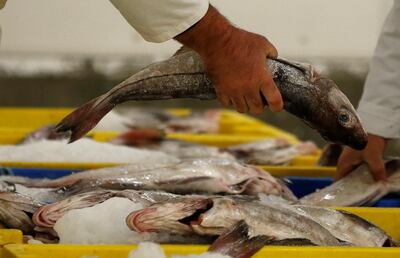Around the Grimsby docks are empty buildings that once processed the catch from the largest fishing fleet in the world.
In the 1950s, Grimsby was home to a fleet of 600 trawlers but the port is now a shadow of its former self. The buildings are either empty or have been put to new purposes; one is home to the offices of an insurance company, another is a karate school.
On a freezing Thursday morning at Grimsby fish market, barely 60 boxes of cod are on sale; some days there is no fish at all.
"We bring in fish from Iceland, we process it here, and sell it in the UK as fish fingers. But nobody in Grimsby does the fishing themselves anymore," Mark Axley, 23, who works in a fish processing factory, tells The National.
The death of the fishing industry is a major reason why many of the town’s voters – 70 per cent – voted for Britain to leave the European Union.
The Brexit paradox is that towns most vulnerable to economic upheaval are the most willing to take their chances. Impact reports leaked to the media this week showed that it is the UK’s north-east, within which Grimsby firmly lies, that will be the hardest hit of any region following the break-up.
Overall the figures suggested economic decline of 3 per cent nationwide even if the UK remains in the single market and a 16 per cent hit if no deal is made.
Although things are already quite bleak in a once proud industry, the reports suggest they could get even worse.
The EU catches 6 million tonnes of fish every year, but barely any of it is caught by Grimsby’s fishermen. What remains of the seafood industry here is now focused on importing and processing fish from overseas. Even that secondary industry still employs more than 5,000 people, and is worth an estimated £6 billion (Dh31bn).
New import taxes on fish could serve as the lethal blow for the comatose town, whilst potential delays caused by customs checks might force production overseas.
Yet for Grimsby’s residents, wariness over the EU runs deeper than employment or immigration, and many lay sole blame for the death of the fishing industry with the EU.
_______________
Read more:
[ 'It's embarrassing': Brexit impact reports shows every scenario will hit UK economy ]
[ Britain to leave EU Customs Union to push on with wider trade deals ]
[ Business Extra podcast: The pros and cons of Brexit ]
[ UK growth to remain weak in 2018 as Brexit uncertainty weighs ]
_______________
Ian Hadigan, 51, is a fishmonger who looks forward to Britain finally cutting ties with the EU. “For me, and all the people I know who voted for Brexit it’s about not just about money, it’s about telling Europe to clear off, and mind its own business.
“I do think we will be wealthier after Brexit, but even so, I’d rather be out of pocket and have a bit of dignity,” he adds.
Mr Axley points out that the industry in the town is now mainly fish processing facilities. Nowadays, fish caught elsewhere is transported to Grimsby where it is prepared and packaged. It is sold across the UK and in other markets where its fishmonger firms have developed an international following.

The nostalgia for the glory days is strong. One of the few bustling parts of town is the Heritage Fishing Centre, where former captains give tours of the docks, and community Facebook groups are teeming with old photos of mighty fishing vessels. But those memories are double-edged - what is left of the Grimsby’s fishing community often shares videos on social media of catch being dumped at sea almost daily – a side-effect of the EU’s Common Fisheries Policy which introduced quotas.
“Europe destroyed Grimsby with the Common Fisheries [Policy], it’s rich for people to tell us that leaving the EU will do us harm,” Mr Hadigan said. “Years of us throwing perfectly good catch in the sea is what killed us."
Whether or not the demise of Grimsby’s fishing industry can be entirely attributed to the EU is not as certain as many in the town would have one believe. Over-fishing, rival ports, and the Cod Wars of the 1970s with Iceland all contributed. But perception is everything, and for many there is absolute conviction that Brussels is to blame.
Rejecting the significance of the recent impact assessments that emerged in the British press on Thursday, Adam Spinneyson, a 19-year-old student, said the claims were just another version of the establishment’s so-called Project Fear, when government officials predicted a "Leave" vote in 2016 would trigger economic collapse.
“They would say that. What they don’t understand is, the more they laugh at us, and the more they try their scare games, the more we want to leave,” he said. “If we voted again tomorrow it would be even more.”
Business leaders are scrambling to head off what they fear is oncoming calamity. Late last year the town’s fishing guild called for the establishment of a free trade zone for seafood.
The call was met with ridicule by some, others accused Grimsby of hypocrisy, citing how staunchly in favour it was of leaving the EU. The belief that Brussels killed the town’s signature industry runs too deep for most residents to change their minds.







